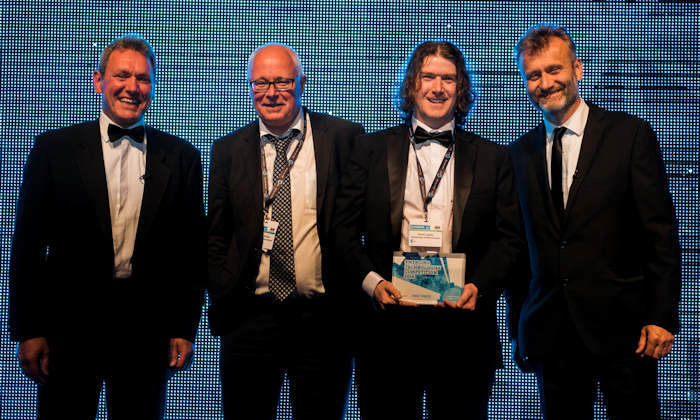University of Manchester spin-out wins at RSC Emerging Technologies Competition
24 Jun 2016
University spin-out, Sci-Tron Ltd, fought off stiff competition to win first prize in the Materials category at the Royal Society of Chemistry’s annual Emerging Technologies Competition 2016

Forty shortlisted entrants pitched their ideas to a panel of expert judges which took place at Chemistry Means Business, a two-day event for the chemistry-using industry organised by the Royal Society of Chemistry in London. The winners were announced at an awards ceremony hosted by TV personality Hugh Dennis as part of the same event.
Sci-Tron, co-founded by Dr Scott Lewis, Professor Richard Winpenny and Professor Stephen Yeates, all from the University’s School of Chemistry, is a nanotechnology specialist working with novel nanomaterials.
These include advanced electron beam resists for the production of integrated circuits and state-of-the-art resins for 3D bio-imaging. Sci-Tron’s electron beam lithography resist materials will enable the fabrication of masks for the next generations of semiconductor manufacturing processes, unlocking the development of more complex, higher performance integrated circuits (ICs) with lower power consumption. Benefits of advanced ICs include the possibility to add more computing power and 'intelligence' at lower cost.
Sci-Tron co-founder Dr Scott Lewis said: “This competition is highly competitive and prestigious so we are delighted to have been awarded first prize. To have industry recognise the potential of this new technology is extremely positive and we hope that our technology will go on to a significant impact within the semiconductor industry.”
Applications were judged on the degree of innovation of the technology, its potential impact, and the quality of the science behind it. Sci-Tron will receive tailored business support from one of the Royal Society of Chemistry’s multinational partner companies, business training, media support, and a cash prize of £20,000.
Dr Steve Pleasance, Head of Industry at the Royal Society of Chemistry said: “Increasing innovation in the chemical sciences is one of the key elements of the Royal Society of Chemistry’s industry strategy.
“Our Emerging Technologies competition, now in its fourth year and supported by our industry partners, is proving to be highly successful in accelerating the commercialisation of the cutting-edge research taking place in both universities and small companies.”
Winning the competition gives businesses the platform they need to make the industry aware of their technology. Since the initiative began in 2013, our winners have gone on to raise a combined total of over £16 million in further funding, grown their companies and entered commercial contracts.
A previous winner went on to secure US$1.7 million of funding from the Bill and Melinda Gates Foundation to develop their novel treatment for iron deficiency anaemia, whilst another received support from GSK and was awarded over £2.5 million to take their enzyme catalysis technology towards market.
Find out more at Sci-Tron.
Pictured are Professor Stephen Yeates and Dr Scott Lewis, from the University’s Faculty of Engineering and Physical Sciences and co-founders of the successful University spin-our company Sci-Tron Ltd, collecting first prize in the Materials category of the Royal Society of Chemistry’s annual Emerging Technologies Competition 2016. The accolade was presented by host Hugh Dennis.
